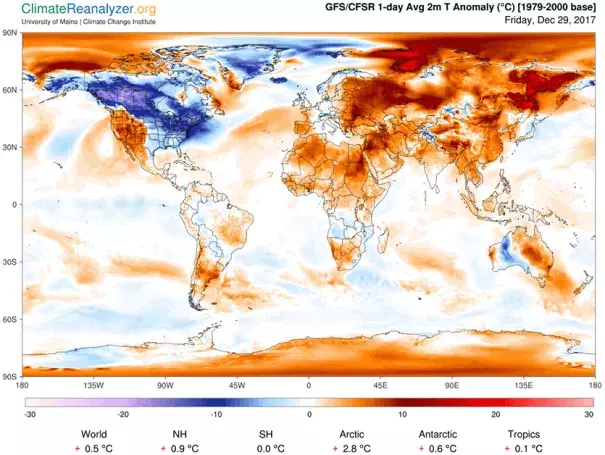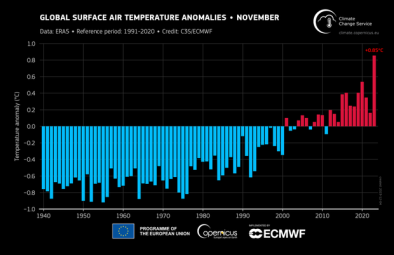New Year’s Freeze-Out: It Can Still Get Cold, Even in a Warming Climate

Are we safe to ignore global warming because it’s cold outside? In a tweet published on December 28, President Donald Trump wrote this:
In the East, it could be the COLDEST New Year’s Eve on record. Perhaps we could use a little bit of that good old Global Warming that our Country, but not other countries, was going to pay TRILLIONS OF DOLLARS to protect against. Bundle up!
Indeed, some parts of the eastern U.S. are expecting bitter, record-breaking cold for New Year’s Eve. Unfortunately, this doesn’t mean human-produced climate change is something we’ve put behind us.
The United States is not the world. The eastern U.S. occupies less than 1% of the world’s surface. Most of the planet is expected to be warmer than average over the next few days. But the coldest departures from average will be located over the eastern United States and Canada, so it’s easy to focus on that one part of a much bigger picture.
Climate change doesn’t get rid of weather. We can still expect cold waves and heat waves, even as greenhouse gases make our overall climate warmer over time. And since global warming doesn’t change the fact that Earth is tilted on its axis, winter still happens.
This has been one of the warmest years in U.S. history. For January through November, this year’s average U.S. temperature was the third warmest in records going back to 1895. The only warmer years (for Jan.-Nov.) were 2012 and 2016, according to NOAA. As of Dec. 24, NOAA reported more than 33,000 daily record highs this year, but only about 9000 daily record lows.
Climate change may be raising the odds of winter cold waves in the eastern U.S. Several groups of scientists have found that warming in the Arctic and the resulting loss of sea ice are making it more likely that the jet stream will take dramatic wintertime dips and push intense cold outbreaks into midlatitude areas, such as the eastern U.S. These cold waves aren’t enough to compensate for the overall warming of the climate across the whole planet.
Related Content






